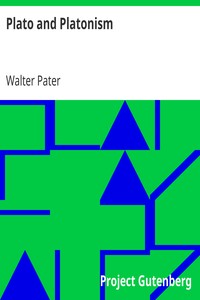Plato and Platonism by Walter Pater
"Plato and Platonism" by Walter Pater is a philosophical examination written in the early 20th century. The text delves into Plato's ideas, exploring the origins and implications of his thoughts on various doctrines, including motion, rest, and the nature of knowledge. Pater presents Plato not just as an original thinker but as a figure deeply rooted in the philosophical debates of his time, influenced by the legacies of earlier philosophers such as
Heraclitus and Parmenides. The opening of the work introduces the idea that philosophical knowledge builds upon previous intellectual traditions rather than emerging from a void. Pater emphasizes that even Plato’s most cherished concepts are inextricably linked to earlier thinkers, reflecting a continuum of thought rather than a radical departure. The chapter discusses the doctrine of motion and its associated challenges, particularly Plato's critique of Heraclitus’ notion of perpetual flux. Pater indicates that Plato's inquiry is a search for unchanging truths amidst the chaos of human perceptions—a theme that resonates throughout the text. This introductory portion establishes the groundwork for a deeper exploration of Plato's philosophies and their relevance to contemporary thought. (This is an automatically generated summary.)
Read or download for free
| How to read | Url | Size | |||
|---|---|---|---|---|---|
| Read now! | https://www.gutenberg.org/ebooks/4095.html.images | 491 kB | |||
| EPUB3 (E-readers incl. Send-to-Kindle) | https://www.gutenberg.org/ebooks/4095.epub3.images | 243 kB | |||
| EPUB (older E-readers) | https://www.gutenberg.org/ebooks/4095.epub.images | 250 kB | |||
| Kindle | https://www.gutenberg.org/ebooks/4095.kf8.images | 436 kB | |||
| older Kindles | https://www.gutenberg.org/ebooks/4095.kindle.images | 419 kB | |||
| Plain Text UTF-8 | https://www.gutenberg.org/ebooks/4095.txt.utf-8 | 467 kB | |||
| Download HTML (zip) | https://www.gutenberg.org/cache/epub/4095/pg4095-h.zip | 241 kB | |||
| There may be more files related to this item. | |||||
Similar Books
About this eBook
| Author | Pater, Walter, 1839-1894 |
|---|---|
| Title | Plato and Platonism |
| Credits | This etext was produced by Alfred J. Drake, Ph.D. |
| Reading Level | Reading ease score: 48.6 (College-level). Difficult to read. |
| Language | English |
| LoC Class | B: Philosophy, Psychology, Religion |
| Subject | Plato |
| Subject | Philosophy, Ancient |
| Category | Text |
| EBook-No. | 4095 |
| Release Date | May 1, 2003 |
| Most Recently Updated | Dec 27, 2020 |
| Copyright Status | Public domain in the USA. |
| Downloads | 533 downloads in the last 30 days. |
| Project Gutenberg eBooks are always free! | |

